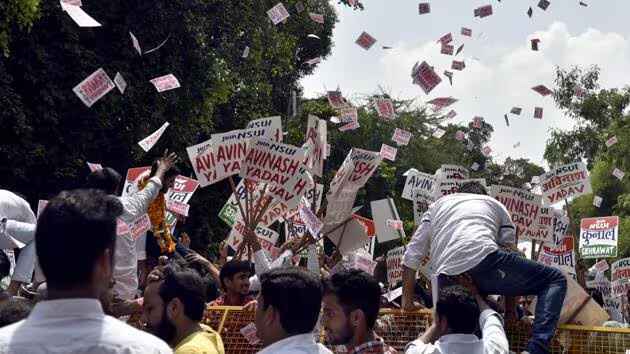The music industry giant Sean “Diddy” Combs faces serious allegations of sex trafficking and abuse. Lawsuits reveal disturbing accounts of exploitation, while societal desensitisation and memes undermine the gravity of these issues and the plight of victims.
Trigger Warning: Mention of sexual assault and rape
The hip-hop music industry, which started off as a cultural rebellion born under the influence of Black Panthers, has become politically hollow and morally degenerate. Unchecked power and incalculable influence permeate the music record labels, shaping the sounds we hear and the faces we idolise today. The most prominent faces in the music industry, even our favourite celebrities, too imprudent and decadent in their greed for power and money, are often complicit in the toxic power structures that perpetuate the endless cycle of exploitation and corruption.
Sean “Diddy” Combs, a rapper and music magnate credited with helping launch the careers of some of the biggest stars through his record label ‘Bad Boy Records’ and creating a monopolist empire of his own in the music industry, was arrested in September on sex trafficking and racketeering charges with federal prosecutors alleging that Combs and his associates threatened, abused, and coerced women, minors, and others around him “to fulfil his sexual desires.” It also included forcing victims into engaging in recorded sexual activity, which he referred to as “Freak Offs.” On October 1, The Los Angeles Times reported, more than 100 people have planned to file lawsuits against Combs, alleging that he sexually abused and exploited them.
However, by 14th October, six more lawsuits were filed, mostly by victims who were sexually assaulted by Combs when they were minors. Combs, throughout his career, has been linked to a number of conspiracy theories and accused of numerous charges. In 2003, his clothing brand, Sean John, was accused of violating Honduran labour laws as the factories were based in Honduras. The National Labour Committee said that the employees were forced to work overtime and were paid sweatshop wages. In 2017, he was sued for sexual harassment by his chef, and the suit was settled out of court. However, since Casandra “Cassie” Ventura, singer and Diddy’s ex-girlfriend, filed a lawsuit against him in November 2023, a multitude of allegations have come out against him.
After years of silence and darkness, I am finally ready to tell my story and to speak up. On behalf of myself and for the benefit of other women who face violence and abuse in their relationships,” states Casandra.
Casandra met Combs in 2005 when she was 19 years old and was signed under his label. The lawsuit also states that Diddy used his position of power to “set the groundwork” for a “manipulative and coercive romantic and sexual relationship.” She also accused the musician of sexual abuse and rape and claimed that many of these incidents were witnessed by his “tremendously loyal network,” who “were not willing to do anything meaningful” to stop the violence.
They settled the case for an undisclosed amount a day after it was filed in New York. However, the chain of sexual assault lawsuits that followed after dates back to 1991. An anonymous lawsuit was filed by a woman who alleged that Diddy, along with another man, coerced her into engaging in sexual activities. In a separate case, Joi Dickerson-Neal accused the artist of drugging and sexually assaulting her when she was a college student in 1991. She further claimed that he filmed the incident and later shared the footage with others without her consent. In a third lawsuit, Liza Gardner alleged that Diddy and another individual sexually assaulted both her and a friend over three decades ago, when she was 16 years old. All of these lawsuits came forward shortly before the expiration of the New York Adult Survivors Act. The act gave the victims the ability to file civil lawsuits, even after the statutes of limitations have expired.
The prosecutors in the indictment claim that Combs and his associates allegedly transported sex workers across state lines—which constitutes sex trafficking and transportation—to engage in prostitution and allegedly drugged women to keep them “obedient and compliant.” USA attorney Damien Williams said Sean Combs led and participated in a racketeering conspiracy that used the business empire he controlled to carry out criminal activity including sex trafficking, forced labour, kidnapping, arson, bribery, and the obstruction of justice. He further implied that there are three main charges that Diddy is currently facing: racketeering, sex trafficking, and transportation to engage in prostitution. During a search of Combs’ residences in March, investigators reportedly recovered over 1,000 bottles of baby oil and lubricant, along with other items referred to as “Freak Off supplies,” according to the indictment. Additionally, firearms and ammunition were discovered, including “three AR-15 rifles with defaced serial numbers.”
The internet has restored “Thanking Beyoncé” as a meme following her alleged close relationship with Combs. In a spiral of various conspiracy theories that are being spinned, a theory linking Beyoncé and Jay-Z to the deaths of several prominent artists is gaining traction online. It is being alleged that the couple may be connected to the untimely deaths of figures such as Aaliyah, Lisa “Left Eye” Lopes, and Michael Jackson, implying they were targeted for not aligning with the interests of a powerful trio, including Combs. Video clips presenting the intriguing frequency with which celebrities express gratitude towards Beyoncé and Jay-Z during award ceremonies, even without direct connections to the event, are also being highlighted. Adele’s acknowledgement of Beyoncé during her 2017 Grammy acceptance speech and Britney Spears’ tribute to the couple at the 2023 People’s Choice Awards have led fans to speculate about the couple’s influence within the entertainment industry.
Further, past videos of Combs with Justin Bieber, shot when the latter was still a minor, have resurfaced. In one of the videos, Sean Diddy mentioned spending 48 hours with Justin, which he referred to as a ’15-year-old’s dream’.
All of these charges against Combs are repulsive and excruciatingly horrific. The information regarding the 1,000 bottles of baby oil took social media by storm and entirely for different reasons. Too many memes related to the incident obscured the gravity of the situation. The collective moral apathy towards the victims exposes a deep-seated moral decay of our society. We are so beaten down by the endless cycle of exploitation and desensitised by the constant stream of media that we have resorted to humour as a coping mechanism. By turning a heinous crime into mere internet fodder, we allow the real predator to slip through the cracks, much like what happened with the Epstein Island case, all forgotten.
Read Also: Coldplay, Concerts, and Cash Cows
Image Credits: AFP via Getty Images
Reeba Khan






